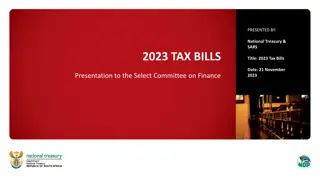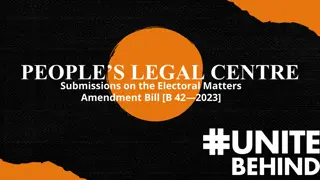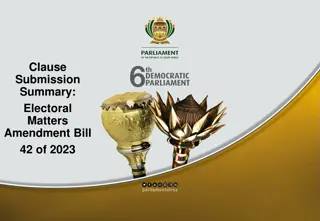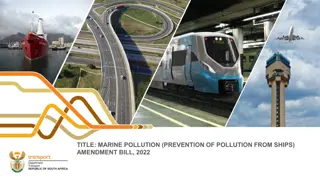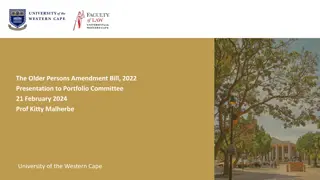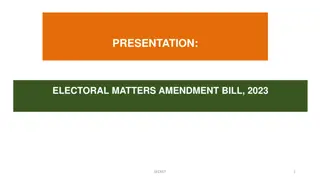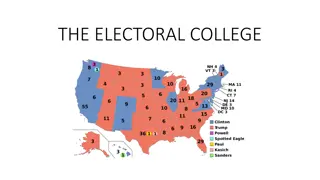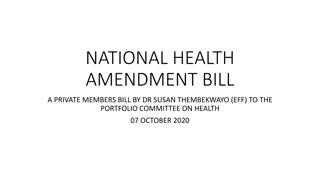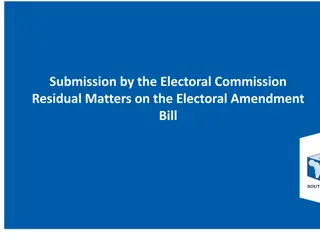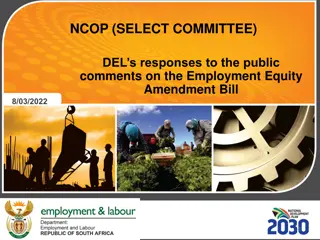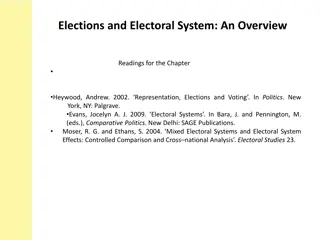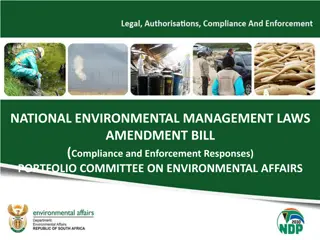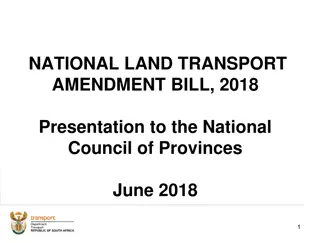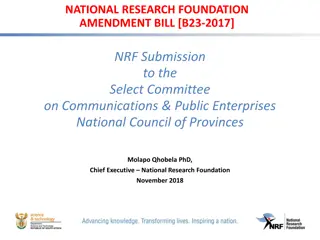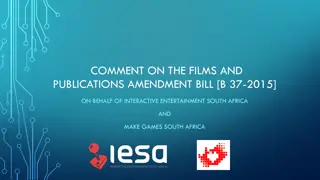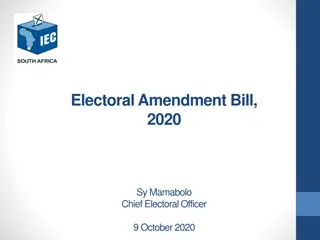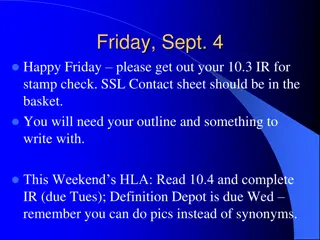RE: ELECTORAL MATTERS AMENDMENT BILL [ B42-2023]
Background information on the CLSO's considerations of the Electoral Amendment Act and Electoral Matters Amendment Bill, addressing legal and constitutional issues raised in public submissions. Important clauses critiqued include Clause 3, 7, 9, 18, 26, 31, and 31B in various Acts. Public concerns over rushed process and lack of proper public participation noted.
Download Presentation

Please find below an Image/Link to download the presentation.
The content on the website is provided AS IS for your information and personal use only. It may not be sold, licensed, or shared on other websites without obtaining consent from the author.If you encounter any issues during the download, it is possible that the publisher has removed the file from their server.
You are allowed to download the files provided on this website for personal or commercial use, subject to the condition that they are used lawfully. All files are the property of their respective owners.
The content on the website is provided AS IS for your information and personal use only. It may not be sold, licensed, or shared on other websites without obtaining consent from the author.
E N D
Presentation Transcript
Joint Meeting of the PC on Home Affairs & SC on Security and Justice RE: ELECTORAL MATTERS AMENDMENT BILL [ B42-2023] 1
BACKGROUND The CLSO has considered: The Electoral Amendment Act, 2023 (Act 1 of 2023); The Electoral Matters Amendment Bill [B42-2023]; The Written Submissions received by the Portfolio Committee; The Oral Submissions that took place 06 February 2024; and The various legislation that will be amended by the Electoral Matters Amendment Bill. The CLSO considered the legal and constitutional issues raised in both the oral and written submissions The purpose of this presentation is to address only the LEGAL and CONSTITUTIONAL issues Policy issues had been left to the Executive to address. 2 22
INTRODUCTION The Public raised the following Constitutional and interpretation issues on the Bill: General Comments to the Electoral Amendment Bill Political Party Funding Act: Clause 3 The definition of independent representative and independent candidate and the use of the terms throughout the amendments to the PPFA, including the omissions of the terms in certain sections. Clause 7 & 29 concern regarding the amendments to the calculations pertaining to the allocation of funds to Representative Political Parties and Independent Representatives Clause 9 - The inequality in the provision that denies the use of funds to defray litigation costs Clause 18 insertion of new section 12A Clause 26 - unfettered discretion of the President to determine regulations Electoral Act: Clause 31 - Objection to the restriction on a voters restriction in voting for regional seats in a region they were registered. Clause 31B - Unequal signature threshold Electoral Commission Act General Comments: Certain sections not amended Electronic Broadcasting Act: General Comments: - Certain sections within the Act are missing amendments to include independent representatives - Include a definition of independent representatives Financial Management of Parliament and Provincial Legislatures Act General Comments: Certain sections not amended 3 3
GENERAL COMMENTS SUBMISSIONS: Public participation was lacking, the Bill has been rushed with unprecedented haste. The period for public comments was extremely short Not enough time allocated to prepare submissions The inclusion of unnecessary and controversial changes, invalidates the public consultation process and potentially opens the legislation to legal challenge. 4 4
LEGAL RESPONSE Reasonableness is the standard to be applied on whether Parliament met its Constitutional Obligation- see section 59 and 72 of the Constitution. The reasonableness of Parliament s conduct depend on the particular circumstances and facts at issue. Courts in Doctors for Life judgment established the following criteria that should be used when determining whether Parliament s conduct is reasonable in as far as facilitating meaningful public involvement as set out in section 59 and 72 of the Constitution: The rules it has adopted for this purpose; The nature and importance of the legislation in question Any need for its urgent adoption (time and expense). The Constitutional Court in the LAMOSA judgment provided us with further guidance with regard to the reasonableness standard: there are at least two aspects of the duty to facilitate public involvement: i. the duty to provide meaningful opportunities for public participation in the law-making process; and ii. the duty to take measures to ensure that people have the ability to take advantage of the opportunities provided. 5 5
LEGAL RESPONSE The Committee Secretary confirmed the following: The Electoral Matters Amendment Bill ( the Bill ) was introduced in Parliament on the 8 December 2023 and after deliberating on the Bill and questioning the Department on certain issues, the Department of Home Affairs informed the Portfolio Committee that it was of the view that Parliament proceed with the Bill as introduced. The advertisement calling for comments was published on the Parliament website and social media on 14 December 2023. A second advert went out on 11 January 2024 and the closing date for comments was 26 January 2024 On the 29 January 2024, the Committee invited submitters of written submissions to present oral submissions, which took place on the 6 February 2024. Radios advertisements were aired during the period of 24-26 January 2024 The Committee has a considerable amount of pressure to finalize the Bill, considering the looming deadline of the National Elections and the importance of this legislation in ensuring a well-run election. We are of the view that sufficient time was allowed for inputs into the Bill. 6 6
[PPFA] CLAUSE 3 definitions and use of independent representative & independent candidate throughout the Bill SUBMISSION: The terms independent candidate and independent representative are unevenly applied throughout the Bill. independent representative and independent candidate are not included in a number of sections in the PPFA: In the definition of donation and donation in kind section 10 Section 14 (only independent candidates and political parties are included in section) section 19 (3) and (4) Section 23 (2) failed to be amend and independent candidates and independent representatives excluded. The definition of Independent candidate is vague. It is redundant to state an independent candidate is not a member of the party. Definition lacks clarity regarding what is the meaning behind intending to contest an election. Definition is not synchronized with the Electoral Act and therefore could violate the Constitutional Courts ruling regarding individual accountability 7 7
LEGAL RESPONSE In the definition of donation and donation in kind AGREE The definitions use the term political party in the describing what constitutes a donation or a donation in kind . It therefore should include independent candidate and independent representative . The DHA should provide clarity if the policy intention is that a donation in kind or a donation will apply to all independent candidates regardless of whether they receive a seat in the NA, as a donation or donation in kind applies to all political parties regardless of their representation in the NA. section 10 AGREE This provision provides that no person may make a donation to a political party or a member of a political party with the expectation that the party or member concerned will influence the awarding of a tender. It does not include independent candidates or independent candidates with a seat in the NA or provincial legislatures (i.e. independent representatives). There is no legal justification for this exclusion, unless the DHA has a policy intention to not include independent candidates in this provision. If so, it must provide reasons for the exclusion. Furthermore, the DHA should provide a policy understanding as to why the section was amended as currently section 10 prevents any person or entity from delivery a donation to a member of a political party other than for political party purposes. It now includes the proviso in expectation that it will influence an award of a tender, license or approval etc. ) 8 8
LEGAL RESPONSE Section 14 - DISAGREE - (only independent candidates and political parties are included in section) Section 14 relates to the Commission's duty to monitor compliance by political parties with the Act. The amendment therefore now includes ALL independent candidates, regardless of whether they receive a seat in the NA or provincial legislatures. Therefore, there is no need to include independent representatives. However, this section could be interpreted widely to mean that once an independent candidate gains a seat, the provision does not apply to them. The DHA to advise the policy intention. section 19 (3) and (4) AGREE Section 19 stipules offences and penalties. The amendment then introduces a subsection (3) which provides that any person who makes a donation to influence a tender or license commits an offence and stipules a fine. It then introduces a subsection (4) which creates an offence for any person who makes a donation to a member of a political party as opposed to the political party itself, in order to circumvent provisions of chapter 3 (direct donations to political parties, independent representative and independent candidates). There is no legal justification to exclude independent representatives or independent candidates in subsection (4), as the reference to Chapter 3 includes them. The DHA must provide policy as to why they have been excluded, unless this was an omission. 9 9
LEGAL RESPONSE Section 23 (2) failed to amend and therefore independent candidates and independent representatives excluded. AGREE - section 23 provides that Parliament or a provincial legislature may not fund represented political parties other than through section 57(2) and section 116(2) of the Constitution. The Constitutional Court in the New Nation judgment held that these sections of the Constitution do not negate the possibility of independent candidates participating in the National Assembly and the provincial legislature and in turn refer to independent candidates. Therefore section 23(2) of PPFA should be amended to include independent representatives. 10 10
LEGAL RESPONSE The definition of independent representative and independent candidate are vague In terms of drafting prescripts, a definition needs to avoid ambiguity and has 3 broad classes to delimit (determine the limits of the significance attached to the term), to extend (adding to the conventional meaning of the term) and to narrow (to narrow the term and limit the usual meaning)). A definition should assist the reader and not state the obvious. The definition of independent candidate does not align with the definition in the enabling legislation, that warranted the consequential amendments: Electoral Act : independent candidate means a SA citizen contesting an election and who is not nominated on a list of a party. PPFA: independent candidate includes any person nominated to contest or intending to contest an election for the National Assembly, provincial legislatures and municipal councils, who is not a member of or is not nominated by a political party . ) 11 11
LEGAL RESPONSE The definition of independent representative and independent candidate are vague (continued): The definition extends the definition contained in the enabling legislation and confuses the reader, as it states the obvious, as section 31A of the Electoral Act provides for the nomination process, therefore it would appear to be unnecessary to unpack that the independent candidate must be nominated, as contestation of an election by an independent candidate automatically would require a nomination in terms of section 31A. A simple solution would be to revert to the definition contained in the Electoral Act and reference the Electoral Act in the definition. Moreover, the definition of independent representative should include the term independent candidate as to expand and de-limit the definition. A simple solution would be to re-draft the definition as means an independent candidate who is a member of the National Assembly or a provincial legislature. This would therefore curtail the ambiguity created by who is not a member of or is nominated by a political party . ) 12 12
[PPFA] CLAUSE 7 & 29 amendment to calculations SUBMISSIONS: Call for allocation to be calculated per seat This amendment is a significant shift in the allocation formula and reverts back to the previous formula that was in place prior to the PPFA. Opposition to formula undermines proportionality Not a consequential amendment Amendment will disadvantage smaller parties and independent representatives, and in favour of bigger and more established political parties who have more seats. Drafting of clause 29 is problematic and vague The amendment to item 7 of Schedule 2 (Upper limit donations) - from time to time what does this mean? Reverts back to the uneven playing field and not a consequential amendment and therefore should not be included. There had been considerable discussions at the time when Schedule 2 was drafted and a reason behind the decision to move from 90 % and 10% to the current two thirds and one third. 13 13
LEGAL RESPONSE This is a substantive amendment as this amendment amends the formula used to allocate funds and is not a simple consequential amendment as a result of the amendment to the Electoral Amendment Act. The regulations to the now repealed Public Funding of Represented Political Parties allocations would be calculated (proportional allocation) / 10 % (equitable calculation). The previous Parliament had its reasons for changing this provision to the two thirds and one third split. reasons were steeped in Policy. The Amendment Bill now reverts to the original formula and this is based on a policy derived from the Executive. It is the prerogative of the Executive to develop policy and it is up to Parliament to then interrogate the policy when it is presented in legislation. Act provided through that a the % 90 These 14 14
LEGAL RESPONSE Therefore, the justification behind this amendment is best left to the DHA to provide an understanding and reasoning behind the amendment. However, CLSO would like to caution the Committee that this is a substantive change to the PPFA Independent Representatives will always have an unequal footing due to the political nature of the institution (independent representatives only having one seat and political parties having more than one). BUT, should the change in formula result in unfairly discriminating independent representatives or smaller parties, the Committee must be mindful of the principles set out in Harksen v Lane - does the provision differentiate between people or categories of people? If so, does the differentiation bear a rational connection to a legitimate government purpose. The rationale behind the legitimate government purpose will be left to the DHA to advise on. 15 15
[PPFA] CLAUSE 9: Purposes for which money can be used for The inclusion of the new section 7(3)(d) seems misplaced and badly drafted Unfairly restricts political parties to cover legal expenses Currently S7(2)(d) of the PPFA provides that political parties cannot use monies allocated to defray legal costs relating to internal political party disputes However, the new addition of section 7(3)(d) provides that independent representatives and political parties cannot use money allocated to cover any costs relating to any litigation against the political party or the independent representative 16 16
LEGAL RESPONSE Section 7 of the PPFA provides the purposes for which money from the Funds may be used. The amendment to section 7 provides for a new subsection (3) that stipulates that the money paid by the Commission to each independent representative may not be used by an independent representative: (a) for the purposes of paying remuneration to a person who is appointed by the State, (b) finance or contribute any event or occasion in contravention of any code ethics, (c) directly establish any business or (d) for the purposes of covering any costs relating to litigation against the political party or independent representative. The drafting creates confusion. It would appear that (d) ALSO applies to political parties, any litigation against the political party or .. Does (d) refer to litigation against political parties or litigation against independent candidates? If (d) only relates to independent representatives, then it should be amended to reflect same. The DHA must provide a policy position herein and the intention of this provision. 17 17
[PPFA] CLAUSE 18 Insertion of new section 12A The PPFA requires all registered political parties to deposit all donations received into bank accounts in the name of the party and money should not be placed in personal bank accounts. Section 18 (a) and (b) does not specify whether the account should be separate from their personal account. Issue that there is nothing to differentiate between monies paid to the independent candidate and their own personal money. Suggestion that section 12A should be amended to ensure that the personal accounts of independent candidates are separate from the account used for donations. Section ignores the operational and financial requirements of running a campaign as an independent candidate 18 18
LEGAL RESPONSE Section 12A (1)(b) provides that an independent representative must keep a separate account with a bank registered as a bank in terms of the Banks Act, into which all money allocated to him or her from the Funds must be deposited . An interpretation issue could arise as this provision raises the question: separate from what? A purposive interpretation would read that the legislature intended for the independent representative to take account for income and therefore the reader could logically infer that the reference to a separate account would be separate from his or her personal account. However, should the Committee wish to have a clearer reading of the provision a re-draft is proposed. 19 19
[PPFA] CLAUSE 26 unfettered discretion of the President SUBMISSIONS: The President (the leader of a party) in consultation with the PC, which comprised of members of the political party decides the level for disclosure. this is a conflict of interest. Constitutional court clear on democracy and funding. as per the My Vote Counts judgment. Infringes upon the right to make informed political decisions, as political parties could reduce disclosure through the President. Similar to an employee determining the conditions of their own salary Suggestion that the determination be made by an independent political body or delete the amendment or add the Minister of Finance to consultative process The President should not have such over arching and exclusive powers. Vague and openness to abuse. President has unfettered discretion far reaching and is a regressive step for accountability 20 20
LEGAL RESPONSE: In our view this is a substantive amendment to the PPFA and not a consequential amendment. In terms of the New Clicks South Africa judgment the making of delegated legislation by members of the executive is an essential part of public administration. It gives effect to the policies set by the legislature and provides the detailed infrastructure according to which this is to be done. Dawood v Minister of Home Affairs dealt with human rights being affected and, in those instances, clear guidance must be given to the Minister who is making regulations. In the Justice Alliance v President of South Africa, the Constitutional Court held that legislative powers are delegated in order to ensure that the legislature is not overwhelmed by need to determine minor regulatory details. Thus, delegation relieves Parliament from dealing with detailed provisions that are often required for the purpose of implementing and regulating laws. However, the delegate is not intended to travel wider than the object of the legislature. The delegate's function is to serve and promote that object, while at all times remaining true to it. 21 21
The Courts in the Executive Council, Western Cape Legislature v the President, provided the extent to which legislative powers may be delegated, namely that there is a difference between delegating authority to make subordinate legislation within the framework of a statute under which the delegation is made, and assigning plenary legislative power to another body, including a Minister, the power to amend the Act under which the assignment is made. Therefore, the Committee is cautioned that in this instance it could be argued that the President has been assigned plenary power. Prior to the proposed amendment, the President only acted on resolution of the National Assembly. The reasoning is that the contemplated in section 6(2) etc affect the rights of political parties and now independent candidates, and that such decisions should be left to a multi-party forum, as opposed to the President, as the head of the executive - a resolution process would ensure this. formulation of regulations 22 22
Furthermore, the current draft provides that the drafting of regulations will take place by the President after consultation which is problematic, as there may be no agreement needed between the parties involved prior to the making of regulations. The Committee is therefore cautioned that the President could possibly consult with the Portfolio Committee and not take the advice or recommendations from the Portfolio Committee. It is further not recommended that a member of the executive does something in consultation with the legislature, as you could reach a stalemate and there is no ultimate power that can make a final decision one way or the other. So, it would equally not be recommended that this be done in consultation . Funding of political parties is fundamental to the promotion of a multi-party democracy. It could be argued that to place this power in the hands of the President, who carries many hats, may affect the principles of democracy enshrined by the Constitution, hence rendering that provision unconstitutional. Lastly, Minister is not defined in the PPFA, therefore section 24(1)(a) requires a definition as to who will the President consult with prior to making regulations. It worth noting that in the current dispensation the power to determine the allocation resides with the National Assembly (a multiparty forum), the dispensation envisaged by the Bill locates this power in the hands of the President (the head of the Executive), this is clearly a SUBSTANTIVE AMENDMENT, the policy for which is not apparent to our office and requires further engagement. 23 23
[ELECTORAL ACT] CLAUSE 31 Amendment to s24A of the Act SUBMISSION: Why is a voter not permitted to vote for regional seats and provincial legislatures in another voting district if they aren t on the voters roll for the province? Questions regarding drafting of the section and the use of or . LEGAL RESPONSE This amendment was suggested by the IEC and they are best place to respond to this technical amendment. However, the understanding during policy development meetings was that the allocation of seats per region is determined by the registered population in a region. It follows then that only voters in that region may influence the outcome of an election for that region. However greater consideration can be given to the submitters concern relating to the drafting of this section, once CLSO consults with the IEC and OCSLA and should any amendment be required this can form part of the deliberation and the A-list. 24 24
[ELECTORAL ACT] reasoning behind the lack of amendment to 31B of the Act SUBMISSIONS: 31B of the Act provides that the signature requirement should be 15% of the quota. This was found unconstitutional and invalid in terms of One Movement SA NPC v President of SA - why was this not amended in the Bill? Why as the Bill not brought parity to the Electoral Act and amended section 27(cB) which currently provides that in order to contest elections unrepresented political parties must provide signatures in support of the party totalling15% of the quota. 25 25
LEGAL RESPONSE The issue of including the read provided by the Constitutional Court and the issue of the disparity between unrepresented political parties and independent candidates was raised at a meeting of the Portfolio Committee on 8 December 2023. The Executive is vested with the primary responsibility for policy development, although Parliament has the primary constitutional mandate to develop legislation, matters concerning electoral system development are by their nature complex and heavily informed by policy consideration. Accordingly, on 12 December 2023 the DHA informed the Portfolio Committee that it is of the view that Parliament must proceed with the Bill as introduced and that the DHA had not formulated a policy position on altering the threshold for unrepresented pollical parties at this stage. Therefore, the Portfolio Committee did not seek to introduce any amendment to section 27(2)(cB) at this stage. Currently the Constitutional Court has been approached for clarity. 26 26
[ELECTORAL COMMISSION ACT] SUBMISSION: Number of sections not amended. Legal Response: There have been a number of sections contained in the Electoral Commission Act that refer to political parties only. The DHA should provide clarity as to why these sections were not amended. Further sections that require amendments include section (6)(2)(b) and (d), section 9, section 20 and section 23 of the Electoral Commission Act. 27 27
[ELECTRONIC BROADCASTING ACT] SUBMISSION: Sections 57(1),(2),(3) and (4), 58(1),(2), (3) and (7) and 59(1), (2)(a), (2)(b) and (3) have not been amended to insert independent representative perhaps a drafting oversight? LEGAL RESPONSE - CLSO agrees that these sections will need amending. 28 28
[FMPPLA] LEGAL RESPONSE Bill neglects to make consequential amendments to section 65(1)(f) which speaks to regulations relating to funding of political parties. 29 29
THE END 30
![RE: ELECTORAL MATTERS AMENDMENT BILL [ B42-2023]](https://cdn1.slideorbit.com/18837/joint-meeting-of-the-pc-on-home-affairs-n.jpg)



